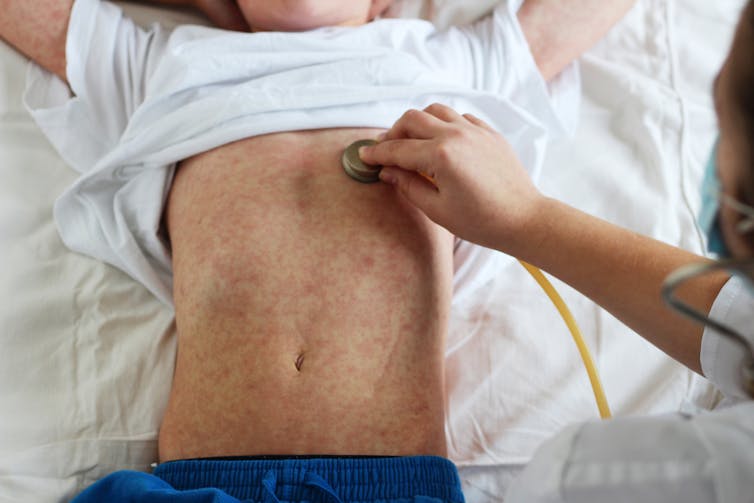are you up to date with your vaccinations?
- Written by Lucy Deng, Staff Specialist Paediatrician, National Centre for Immunisation Research and Surveillance; Clinical Associate Lecturer, Children's Hospital Westmead Clinical School, University of Sydney
About 4.1 million Australians are under-vaccinated, meaning they’ve received some vaccinations, but not all the ones they need.
While the vaccination debate generally centres around children, the majority of people who are under-vaccinated are actually adults.
This places them and others at unnecessary risk of preventable diseases. But it is possible to catch up on missed vaccinations.
Why might you have missed some?
It’s possible you were too afraid of needles as a child, or your parents had ideological concerns about vaccination and never took you to get vaccinated at all. This is probably something you would know about.
But even if you believe you had all your vaccines as a kid, there are many reasons you might not be 100% up to date:
- new vaccines have been added to the immunisation schedule
- if you’ve grown up in another country, you may not have received every vaccine recommended in Australia
- previous ways of recording and reminding people to have vaccines were not as good as they are today, so you may have accidentally missed doses without knowing
- you may have a medical condition that puts you at higher risk of certain diseases and therefore you need additional vaccine doses.
Read more: Australians' attitudes to vaccination are more complex than a simple 'pro' or 'anti' label
Whatever the reason and regardless of your age now, it’s worthwhile to check if you’re up to date with your vaccinations. You can do this by having a chat with your GP or an immunisation clinic nurse.
Measles cases show us why it’s important
Being fully up to date with vaccinations is important to protect against diseases such as measles, whooping cough (pertussis) and tetanus.
Globally we’ve seen a 300% rise in measles cases in the first three months of 2019 compared to the same period last year. There have been nearly as many measles cases in the first quarter of this year in Australia as in all of 2018.
The majority of these measles cases were introduced by healthy Australian travellers who were not fully vaccinated and caught the virus while travelling to countries where the measles is still common, such as India, Philipines, Brazil and Ukraine.
Read more: Why people born between 1966 and 1994 are at greater risk of measles – and what to do about it
So what do you need to do?
Try to locate any written records of past vaccinations and take them to your GP. Your GP can also check your immunisation record on the Australian Immunisation Register, which has records of any childhood vaccinations from 1996 and some adult vaccinations from 2016.
You may be able to access your own immunisation records via your Medicare online account through myGov or the Express Plus Medicare mobile app. Using this information, your GP can work out what vaccines you’re missing.
 Your GP can help you understand which vaccines you might need as an adult.
From shutterstock.com
Your GP can help you understand which vaccines you might need as an adult.
From shutterstock.com
If you can’t find your vaccination records, it’s generally safe to restart vaccinations from scratch. For example, if you’re already immune to measles, having an extra dose of a vaccine containing measles is safe. It will only further boost your immunity.
Sometimes your GP may do blood tests to check if you already have immunity to certain diseases, including hepatitis B and measles, mumps and rubella.
Which vaccines do adults need?
Catch-up vaccinations are free for young adults under 20 years old, and vary in price after that.
Healthy people aged ten and above should make sure they’re up to date with the following vaccinations:
- diphtheria, tetanus and pertussis (whooping cough)
- hepatitis B
- polio
- human papillomavirus (HPV)
- measles, mumps and rubella
- meningococcal
- pneumococcal
- varicella (chicken pox)
- zoster (shingles).
As an adult, the number of extra vaccines needed is generally lower than what is listed in the childhood immunisation schedule. This is because young babies need more doses of the same vaccine to develop adequate immunity, and because some vaccines are not required by the time you reach adulthood.
Read more: High-dose, immune-boosting or four-strain? A guide to flu vaccines for over-65s
If you’re planning on becoming pregnant, it’s vital to ensure you’re immune to viruses such as hepatitis B, rubella and chicken pox (varicella) as they can be passed on to and severely affect the development of an unborn baby.
Whooping cough (pertussis) boosters are important for pregnant women, new parents and grandparents to protect babies who are most at risk of dying from this condition.
Older people should also be getting a booster dose of whooping cough and tetanus vaccines, as immunity can wane over time and these diseases can be serious in older people.
 There’s been a huge surge in measles cases in 2019. People who aren’t fully vaccinated might unknowingly bring measles back from a trip overseas.
From shutterstock.com
There’s been a huge surge in measles cases in 2019. People who aren’t fully vaccinated might unknowingly bring measles back from a trip overseas.
From shutterstock.com
Other vaccines may be recommended depending on your health status, age, lifestyle and occupation – called the “HALO” principle. Certain medical conditions and medical treatments can increase your susceptibility to some vaccine-preventable diseases.
And depending on what you do for work, you may be at higher risk of being exposed to some vaccine-preventable diseases.
Read more: Health Check: which vaccinations should I get as an adult?
For example, the Q fever vaccine is recommended for people working closely with livestock. Q fever is a bacterial infection that often spreads from animals and can cause severe flu-like symptoms.
While guidelines available online are useful, to find out what vaccinations are going to be most appropriate for your personal circumstances, it’s best to chat to your GP.
What if you’ve had a reaction in the past?
If your parents told you not to have a certain vaccine due to a past reaction, it’s worth getting the details and discussing this with your GP.
Certain vaccines, such as the whooping cough vaccine, have changed over time. Some of the reactions seen with previous vaccines are no longer seen in the vaccines used today.
GPs can also discuss specific reactions with an immunisation specialist to develop a plan to safely vaccinate where possible.
Read more: Everyone can be an effective advocate for vaccination: here's how
The immunisation schedule in Australia is constantly changing. Changes are made in response to new scientific evidence, changes in the circulation of diseases in the community and the development of new vaccines.
For your own health and the health of those around you, it’s important to check in with your GP regularly to make sure your vaccinations are up to date.
Authors: Lucy Deng, Staff Specialist Paediatrician, National Centre for Immunisation Research and Surveillance; Clinical Associate Lecturer, Children's Hospital Westmead Clinical School, University of Sydney
Read more http://theconversation.com/health-check-are-you-up-to-date-with-your-vaccinations-116510





